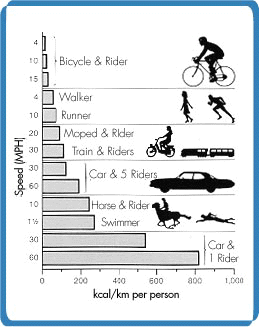

Exercise is important because it can improve one’s health and increase one’s life span. On average, a person should engage in at least 30 to 40 minutes of exercise per day, 3 to 4 times per week. Cycling has been proven to increase the blood flow to the brain. Studies have shown that cycling can reduce the stress levels in one’s body, by inducing a state of “healthy fatigue.” It also strengthens a person’s muscles in the legs and back, reducing the risk of back problems. This type of exercise has been proven to reduce the risk of all kinds of heart problems and vascular diseases that may lead to strokes, high blood pressure and heart attacks.
Although a bicycle is a simple machine, cycling is more efficient than any other method of travel—including walking. It takes less energy to bike one mile than it does to walk a mile. In fact, a bicycle can be up to 5 times more efficient than walking. If we compare the amount of calories burned in bicycling to the number of calories an automobile burns, the difference is astounding. One hundred calories can power a cyclist for three miles, but it would only power a car 280 feet (Spadaccini, 1999).
[Excerpted from class notes for “Science, Technology, and Environment,” by Dr. Peter Waller, University of Arizona, 2002. The above information was compiled by students who did a class project on bicycles. Note that 100 (kilo)calories is roughly the amount of energy required to climb 20 flights of stairs.]
With the evolution of this global, consumer civilization masses of people are advancing who are not creating any values. I feel a need for some kind of existential revolution. Something has to change in people’s consciousness. - Václav Havel